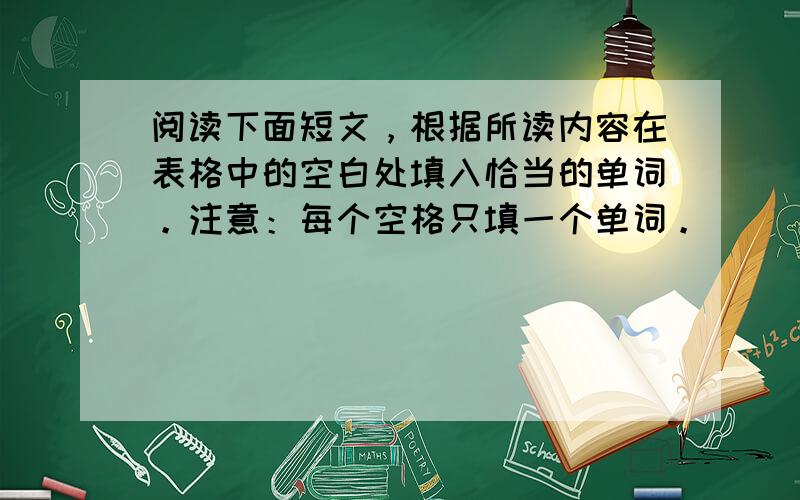阅读下面短文,根据所读内容在表格中的空白处填入恰当的单词。注意:每个空格只填一个单词。
来源:学生作业帮 编辑:大师作文网作业帮 分类:英语作业 时间:2024/11/11 22:16:44
| 阅读下面短文,根据所读内容在表格中的空白处填入恰当的单词。注意:每个空格只填一个单词。 Farmers and gardeners have long used greenhouses to extend the growing season in cold weather. Now, hoop houses are gaining popularity. Some hoop houses are rounded; others are shaped more like a traditional house. A hoop house is basically a metal frame covered with plastic or other all-weather material. A common design looks like a high tunnel. Unlike a greenhouse, which uses a heating system, a hoop house is heated by the warmth of the sun. Now, the United States Department of Agriculture has announced a program to help farmers who want to build hoop houses. The department has been supporting a project in Michigan. That state has a short growing season. As part of the research project, nine farmers were given materials and trained how to build and use a hoop house. The results showed that well-managed hoop houses can grow high-quality crops. However, crops are not the only things that grow well. The research found that weeds grow faster in a hoop house. Weeding (除草), seeding and watering requires at least as much work as crops grown in the open air. The researchers also advise growers to add compost(堆肥) material to the soil in hoop houses to build nutrients. Eliot Coleman is an organic farmer and a writer in Maine who has helped popularize the idea of four-season farming. His ideas about hoop houses sounded good to John Biernbaum in the Horticulture(园艺)Department at Michigan State University. Professor Biernbaum tried hoop houses on the Student Organic Farm at Michigan State and had success. Project director David Conner says it was a "test drive(试车)" for the research on private farms. The agricultural economist points to the demand for locally grown crops. "People are hungry for good, fresh vegetables," he says.
| |||||||||||||||||||

小题1:Shape
小题2:traditional
小题3:Heating
小题4:supported/helped
小题5:growing
小题6:inspired/popularized
小题7:Results
小题8:Advice/Suggestions/Tips
小题9:Compost
小题10:requires/needs/encourages
阅读下面短文,根据所读内容在表格中的空白处填入恰当的单词。注意:每个空格只填一个单词。
阅读下面短文,根据所读内容在表格中的空白处填入恰当的单词。注意:每个空格只填一个单词。
阅读下面短文,根据所读内容在表格中的空白处填入恰当的单词。注意:每个空格只填一个单词。
阅读下面短文,根据所读内容在表格中的空白处填入适当的单词。(注意:每个空格只填一个单词)
阅读下面的短文,根据所读内容在短文后的表格中填入恰当的单词。注意:表格中的每个空格只填一个单词。
任务型阅读.阅读 任务型阅读.阅读下面短文,根据所读内容在表格中的空白处填入恰当的单词.注意:每个空格只填一个单词. &
任务型阅读.阅读 任务型阅读.阅读下面短文,根据所读内容在表格中的空白处填入恰当的单词.注意:每个空格只填一个单词.&n
阅读下面短文,根据所读内容在表格中的空白处填人最恰当的单词。 注意:每个空格只填一个单词。
阅读下面短文,根据所读内容在表格中的空白处填入恰当的单词。注意:每个空格只填一个单词,并请将答案写在答题纸上。
阅读下列短文,根据所读的内容在文章后的表格中填入恰当的单词。注意表格中的每个空格只填1个单词。
阅读下列短文,根据所读内容在文章后的表格中填入恰当的单词。注意:表格中的每个空格只填1个单词。
请认真阅读短文,并根据所读内容在文章后表格中的空格里填入一个最恰当的单词。每个空格只填一个单词。